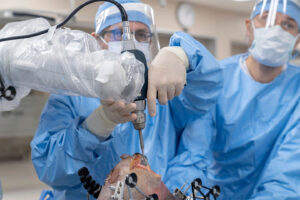
Risk of Osteoarthritis After ACL Surgery
ACL Surgery and Osteoarthritis in the Knee
ACL Surgery and Posttraumatic Arthritis:
ACL reconstructions are commonly performed orthopedic procedures aimed at stabilizing the knee joint. However, individuals who undergo ACL surgery have a heightened risk, 3 to 5 times greater, of developing posttraumatic arthritis. Early interventions are crucial to mitigate this risk and prevent the progression of arthritis. At our practice, we prioritize immediate postoperative physical therapy to restore quadriceps function, as evidence suggests that this can enhance joint absorption and potentially slow down arthritis progression.
Understanding Posttraumatic Arthritis
Posttraumatic arthritis differs from age-related degenerative arthritis in that it originates from a discrete injury event. Early therapeutic interventions may be possible to intervene and halt the biological responses that contribute to its progression.
Impact of ACL Tear on Articular Cartilage
An ACL tear often results in an impaction force that can lead to articular cartilage injury. The subsequent inflammatory process, characterized by the presence of blood in the joint and the release of inflammatory cytokines, can cause chondrocyte death and loss over time, ultimately contributing to osteoarthritis progression.
Osteoarthritis in the Knee
Osteoarthritis is a significant health concern, ranking among the top 10 most costly medical conditions in the United States. It affects millions of adults annually, with approximately 50% to 60% of patients developing knee osteoarthritis following a joint injury. Unfortunately, current cartilage restoration procedures fall short in restoring cartilage to its normal state.
Treatment Approaches for Osteoarthritis
Research into biologic repair of articular cartilage defects is ongoing. Scientists are exploring methods to improve the healing process, such as stimulating stem cell migration and targeting inflammatory cytokines like interleukin-1 (IL-1) and metalloproteinases (MMP-13) to prevent cartilage breakdown. While there are no disease-modifying drugs currently available, early postoperative rehabilitation and knee motion restoration are believed to be crucial in slowing down the risk of arthritis development after an ACL tear.
Are you suffering from Risk of Osteoarthritis After ACL Surgery
There are two ways to initiate a consultation with Dr. Ravi Teja Rudraraju
You can provide current X-rays and/or MRIs for a clinical case review with with Dr. Ravi Teja Rudraraju
You can schedule an office consultation with Dr. Ravi Teja Rudraraju
Conclusion
ACL surgery carries a heightened risk of posttraumatic arthritis, emphasizing the importance of early interventions and rehabilitation. Understanding the inflammatory processes and molecular mechanisms involved in osteoarthritis can guide future treatment approaches aimed at preventing or slowing down arthritis progression in affected individuals.
Latest Post

